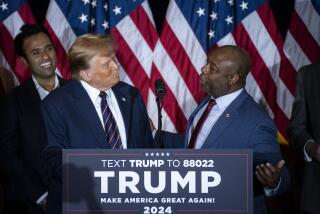Helms’ Attack-Dog Era Fades Into One With Less Bite
- Share via
WASHINGTON — For almost 30 years, Jesse Helms (R-N.C.) planted his feet on the floor of the Senate and, like Southern politicians who once stood in the schoolhouse door to confront the tides of change, trumpeted a simple, defiant credo: “Never.”
Blocking the United States’ payment of its United Nations dues, bottling up presidential appointments, bashing federal support for the arts, opposing almost every aspect of modern-day, activist government, he personified the unvarnished, uncompromising, attack-dog brand of conservative politics.
Yet Helms’ expected retirement may reflect the end of a period that was already fading. Weakened by age and medical problems, he himself had lost some of the old fire.
And what comes after him, among congressional Republicans and in his home state, is likely to be something quite different--still conservative, perhaps, but without the harsh tones and sharp edges. Something less openly confrontational, more “suburban,” as University of North Carolina political scientist Thad Beyle put it.
“He became the focal point of the social conservatives, but I don’t know who there is who can fill those shoes,” Beyle said Tuesday. “Maybe these are shoes that can’t be filled because the times have changed. We may just be seeing the end of an era.”
Only six of his contemporaries have served in the Senate longer than Helms, but in recent years the North Carolina electorate has become significantly more moderate than its senior senator--thanks in part to an influx of high-tech and professional workers drawn to the state’s burgeoning research and financial services sectors.
Helms held on anyway. Partly because he built a fund-raising machine that drew money from ideological conservatives nationwide. Partly because he waged bare-knuckles media campaigns that few opponents could match. Partly because his office responded to the personal problems of constituents with an efficiency that congressional insiders considered a model.
And partly because, with Helms, even some Democratic voters saw something refreshing in the fact that they always knew where he stood, even if they thought he was wrong.
“What’s attractive about that is that it’s simple and understandable. It resonates with a lot of people,” said North Carolina political analyst Walter DeVries. “But over 30 years, I suspect it kind of wears thin.”
“I don’t think there has been anyone in the Senate in recent years that has been as principled, whether you agree with those principles or not, as Sen. Helms,” says Trip Baird, Senate liaison for the conservative Heritage Foundation. “He was not one of those who would look at a poll and decide how to vote. He came in believing what he did and he’ll leave believing the same things.”
James M. Lindsay, a member of the National Security Council staff in the Clinton administration, agreed. Helms’ retirement, if it comes, “brings to a close one of the most colorful Senate careers of recent years. He was the quintessential hero if you agreed with him, or the quintessential crank if you didn’t.”
In Washington, Helms made his mark primarily through the implacable nature of his opposition. Sometimes referred to as “Sen. No,” he tirelessly opposed abortion and fetal tissue research, school busing, reparations for the internment of Japanese Americans during World War II and funding for the National Endowment for the Arts.
Similarly, he was an unwavering supporter of anti-flag burning bills and efforts to allow prayer in public schools.
It was in the field of foreign policy that Helms may have left his deepest mark. He was ranking minority member of the Senate Foreign Relations Committee after 1986 and its chairman from the GOP takeover of Congress in 1994 until it lost control earlier this year. From there, he took hard-line positions against Russia, China, Fidel Castro’s Cuba and the United Nations and in support of anti-communists in Nicaragua and El Salvador.
Among conservatives, at least, Helms’ opposition to payment of U.N. dues is credited with forcing the international body to undertake significant reforms in the way it operates.
“The U.N. has to be happy” about news of Helms’ expected retirement, the Heritage Foundation’s Baird said.
“To be sure, he got them some of their money, but they certainly had to work for it. I don’t think a lot of those U.N. reforms would have happened if it were not for him,” he said.
Some Democrats, on the other hand, think Helms got outmaneuvered on the U.N. issue by Sen. Joseph R. Biden Jr. (D-Del.). And many think the softening process began with Madeline Albright, secretary of State in the Clinton administration.
“Albright treated him with the respect she seemed to think he deserved as the chairman of a major Senate committee,” and Helms responded, said Jack Bass, a specialist in Southern politics at the College of Charleston in Charleston, S.C.
Albright’s efforts reached their zenith in a famously incongruous scene in Helms’ home state, when she presented him with a T-shirt bearing the legend: “Somebody in the State Department Loves Me.”
In return, Helms gave Albright a package of Southern barbecue to take back to Washington.
With Helms gone, the ranking Republican on Foreign Relations--and chairman, if the GOP regains its majority in the Senate next year--would probably be the more moderate internationalist, Richard G. Lugar of Indiana.
Sen. Chuck Hagel of Nebraska, who would move up if Lugar decided not to take the position, is also more moderate than Helms.
Helms was schooled in the race-baiting Democratic politics of the Old South during the 1950s, when he used his position as a widely known radio and television commentator to help an unmistakably racist Democrat, Willis Smith, win a Senate seat.
Critics say those tactics were echoed in Helms’ 1990 campaign against former Charlotte Mayor Harvey Gantt, an African American. In a television ad featuring white hands holding a rejection letter, Helms suggested that Gantt’s support of affirmative action would hurt white voters. Helms defeated Gantt in that campaign and again in 1996.
Like many of his fellow Southerners, Helms later donned Republican armor and embraced the ideological conservatism of Sen. Barry Goldwater of Arizona in the 1960s.
Goldwater’s philosophy was close to the long-standing conservatism of many North Carolina voters, and Helms became the bridge many used to switch parties.
And Helms was on hand to greet the newly elected right-wing Republicans who helped Newt Gingrich launch his “Republican Revolution” in the early 1990s.
Though hard-line conservatives remain powerful in Congress, especially in the House, some of the steam has gone out of the revolution--as reflected in the less abrasive conservatism of President Bush.
Helms, some analysts believe, saw the handwriting on the wall.
“Part of it is that his constituency has changed so much,” said UNC’s Beyle. “There are many more moderates in North Carolina than in the past.”
Beyle noted that “independents” constitute the fastest-growing segment of the state’s electorate, and he believes many of those are Republicans who have become part of North Carolina’s new economy and are reluctant to identify themselves with Helms’ brand of conservatism.
Even if he stayed in the Senate, some believe, Helms would not be quite the fiery battler of old. In recent months, as his health declined, he had changed.
“It may have been a reflection of age,” Bass said, “and a little of the mellowing that comes with awareness of your own mortality.”
*
Times staff writers Ronald Brownstein, Norman Kempster and Robin Wright and Times researcher Robin Cochran contributed to this story.
More to Read
Get the L.A. Times Politics newsletter
Deeply reported insights into legislation, politics and policy from Sacramento, Washington and beyond. In your inbox twice per week.
You may occasionally receive promotional content from the Los Angeles Times.










